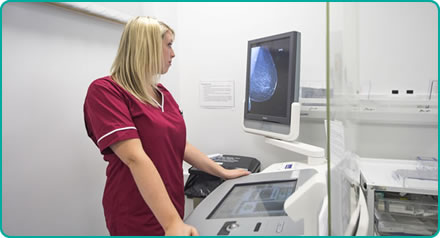Breast screening uses an X-ray test called a mammogram to check the breast for signs of cancer. It can spot cancers that are too small to see or feel. Mammograms are carried out by women called mammographers.
Breast Screening can help to find small changes in the breast before there are any other signs or symptoms. Early detection may mean simpler and more successful treatment. The latest research shows that the NHS Breast Screening Programme is now saving over 1400 lives every year in England.
When you arrive at the breast screening unit, the mammographer will check your details and ask you about any breast problems you may have had. If you have any questions, please ask.

The mammographer will first explain what will happen. She will then place your breast onto the mammogram machine and lower a plastic plate onto it to flatten it. This helps to keep your breast still and get clear X-rays.
The mammographer will usually take two X-rays of each breast - one from above and one from the side. She will go behind a screen while the X-rays are taken. You have to keep still for several seconds each time.
The whole appointment takes less than half an hour and the mammogram only takes a few minutes.
Some women find mammography uncomfortable and some find it painful as the breasts have to be held firmly in position and pressed to take a good X-ray. If you do experience pain it usually only lasts as long as the mammogram although, in a small number of women it may continue for some time.
Talcum Powder or Spray-on Deodrant
Please do not use talcum powder or spray-on deodorant on the day you go for breast screening as this may affect the quality of your mammogram.
Symptoms
If you have a breast symptom or are concerned about your breasts, you should contact your GP. They will decide if you need any tests or investigations.
A mammogram will pick up most, but not all, breast problems and is one of a range of tests that may be required for women with breast symptoms.
